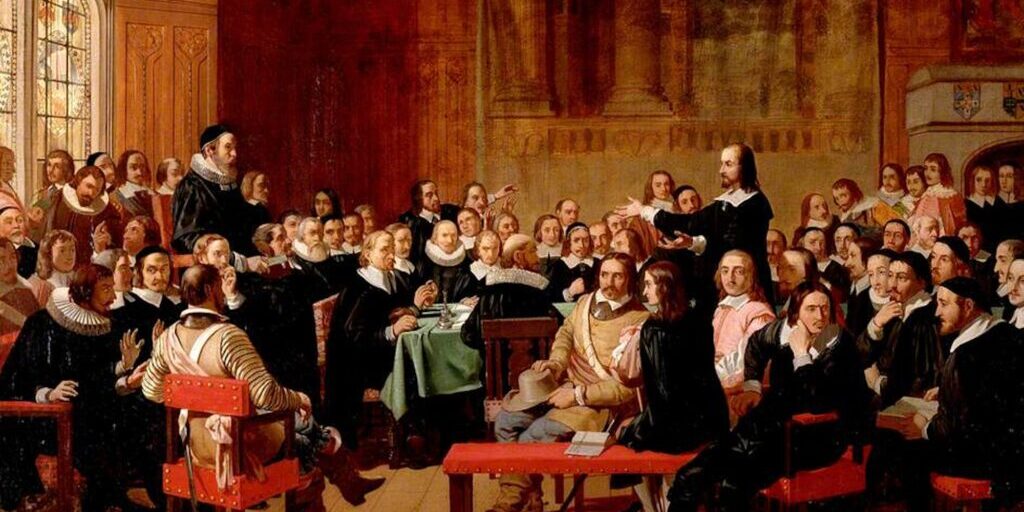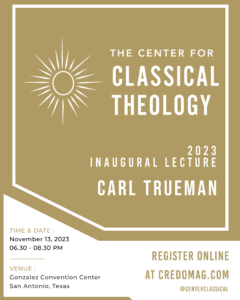
Stephen Charnock: The Clarity of God’s Existence and Providence
I f you only read one book about God’s existence, it must be Charnock’s The Existence and Attributes of God. There is renewed interest in a Reformed Scholastic like Stephen Charnock due to a new two-volume edition of that work edited by Mark Jones. This is an important contribution because Charnock interacts with previous thinkers like Plato and Aquinas and critically appropriates their philosophical or theological insights when strategic. And yet, Charnock makes his own valuable contributions to our knowledge of God, further reforming the Scholastic tradition utilized by the Reformed Orthodox of his day. A look at his footnotes shows that he was familiar with the critical contributions to this subject and that he made his own contributions and corrections to previous thinkers. I believe this is the most important book about God’s existence and needs to be read by every Christian.
f you only read one book about God’s existence, it must be Charnock’s The Existence and Attributes of God. There is renewed interest in a Reformed Scholastic like Stephen Charnock due to a new two-volume edition of that work edited by Mark Jones. This is an important contribution because Charnock interacts with previous thinkers like Plato and Aquinas and critically appropriates their philosophical or theological insights when strategic. And yet, Charnock makes his own valuable contributions to our knowledge of God, further reforming the Scholastic tradition utilized by the Reformed Orthodox of his day. A look at his footnotes shows that he was familiar with the critical contributions to this subject and that he made his own contributions and corrections to previous thinkers. I believe this is the most important book about God’s existence and needs to be read by every Christian.
At a personal level, I was pleased to see this renewed interest in Reformed Scholastics like Charnock. I relied on Charnock in my Ph.D. dissertation and for what became my book, The Clarity of God’s Existence. I cherish an older copy from Baker from those student days. When a skeptical professor asked me who gives arguments to show it is clear that God exists, Charnock was at the top of my list. I began with him and then moved on to the challenges of theistic arguments from thinkers like David Hume and Immanuel Kant. Although living before them, Charnock provided the seeds of what grow into answers to their attacks on reason and the knowledge of God. Charnock interacts with previous thinkers like Plato and Aquinas and makes his own valuable contributions to our knowledge of God. Click To Tweet
What Charnock does that is so impressive is that he does not simply argue for an uncaused cause, designer, or moral governor, but he argues for God the Creator. He gives us a full definition of God and then uses individual arguments to prove each attribute. Charnock shows us that God is a Spirit. He argues for the incommunicable attributes of God (infinite, eternal, and unchangeable) and also that God is good, just, merciful, etc. His definition of God is like what is given in the Westminster Shorter Catechism Q4.
His method corrects mistakes of previous theistic arguments. Rather than giving one argument and then concluding, “this is God,” Charnock gives us arguments for each part of the definition of “God.” He demonstrates that God is Spirit, he demonstrates the incommunicable attributes, and he demonstrates the moral attributes of God. In each case, he has given us an argument we can evaluate for soundness.
Atheism
Charnock begins with Psalm 14:1. Throughout the book, we find his reliance on the Psalms, and this is a reminder to us of how precious they are and the many arguments they give us to know God. The fool says in his heart there is no God. No one seeks God, no one understands, and no one does what is right. Atheism is without excuse. It is not an intellectually or morally defensible position. And yet it is at the core of the human condition. “None seek” means “noneseek.” Although humans might view themselves as doing their best in pursuing God, the truth is that in their postlapsarian natural condition, they are not doing so. No one understands or knows God as they should. Charnock makes the problem of God’s existence an existential problem for all of us. It cannot simply be a fun puzzle or challenge. Each of us must answer before God for our own failure to seek and understand.
Charnock defines three kinds of atheism. He says:
There is a threefold denial of God. 1. Quoad existentiam; this is absolute atheism. 2. Quoad Providentiam, or his inspection into, or care of the things of the world, bounding him in the heavens. 3. Quoad naturam, in regard of one or other of the perfections due to his nature (24).
Today, when we say “atheist,” we usually mean a materialist. We mean a person who says that only matter exists and that matter has always existed. There were ancient materialists like Democritus and there are very obvious contemporary atheists like Richard Dawkins. But this also means those who deny the existence of God, the Creator, who brought the universe into existence rather than existing alongside it from eternity, as Plato and Aristotle taught. It also includes the pantheist who denies the existence of God the Creator by saying that “all is God.” We can call these the dualists (both God and the universe exist without a beginning) and the monists. Charnock makes the problem of God's existence an existential problem for all of us. Click To Tweet
His second definition of atheism makes this a much larger group and is more like what I call Biblical Atheism. This is the atheist who denies the providence of God. We find such a one described in Psalm 73:11 or Psalm 94:7. Here, too, we find Aristotle. Although Charnock will use vocabulary and insights from Aristotle in his theology proper, he is willing to criticize the philosopher for not using reason to understand the providence of God. He, like those in the Psalms just mentioned, posited a God that does not see and does not rule. For this, he was without excuse. This is also the Absolute of theologians like Tillich and being itself in Heidegger. Just like it is clear to reason that God exists, so too it is clear to reason that God rules and is sovereign.
His third definition pertains to the denial of particular parts of the definition of God. For instance, the open theist denies that God is unchangeable. Or the anthropomorphite denies that God is infinite. Both of these are usually the outcome of a failure to understand the so-called problem of evil. Here, Charnock points us to that highest and ultimate end: the knowledge of the glory of God. God rules over all things for the revelation of His glory. And our highest end is to see this glory revealed in all of His works. This both provides a solution to the problem of evil and also a teleology for all of the events of our lives.
He also discusses practical atheism, which brings atheism home to each of us. Practical atheism means living as if there is no God. It is living as if God is not real. Charnock tells us it is ungrateful contempt of God. Such a person could say the right words and claim to hold to the right theories but live as if there is no God. In fact, the way it normally works is that a person is living this way, and when called to give an account of their lives, it is then that their mind casts about looking for an intellectual defense. This is the condition of self-deception that then gets shared with others as self-justification. Atheism is an attempt at just such self-justification.
Charnock tells us the biblical solution, also knowable from general revelation, for practical atheism: the fear of the Lord. All understanding begins here. We are not able to get away with intellectualizing our belief about God and not having it affect our lives. Such a condition exhibits a lack of the fear of God. Even in the prelapsarian state, we would have a fear of God as the reverence and awe due to the sovereign Creator. But postlapsarian, when we come to understand our condition in unbelief, not understanding God as we should have, we are aware of our sin and the holiness of God. We know our just condemnation. Atheism is an attempt to solve this burden by denying it is real. It is a false remedy that, in the end, brings ruin. Charnock points us to that highest and ultimate end: the knowledge of the glory of God. Click To Tweet
He says, “Let us labor to be sensible of the atheism in our nature, and be humbled for it.” It is contrary to reason. “The unreasonableness of it concerns God. It is the high contempt of God. It is inverting the order of things; a making God the highest to become the lowest; and self the lowest to become the highest.” We attempt to make ourselves god and deny the true God. It is the original sin and it is the sin that each person commits. The atheist exalts himself and calls God a liar by saying he is seeking, but there is not enough evidence of God.
Practical atheism is the denial of the law of God. That law begins by commanding us to love God. This law is written on our hearts, meaning it is the very nature of things. By nature, as rational beings, our duty is to love our Creator and seek to know Him. Sin is an act contrary to the nature of things as ordained by God. In that sense atheism, unbelief, is the first sin. It is the root sin that gives sprout to the other sins. We neglect to know the will of God, and we are not inclined to keep the known will of God. “Let us be sensible of the atheism in our nature, and be humbled for it.”

